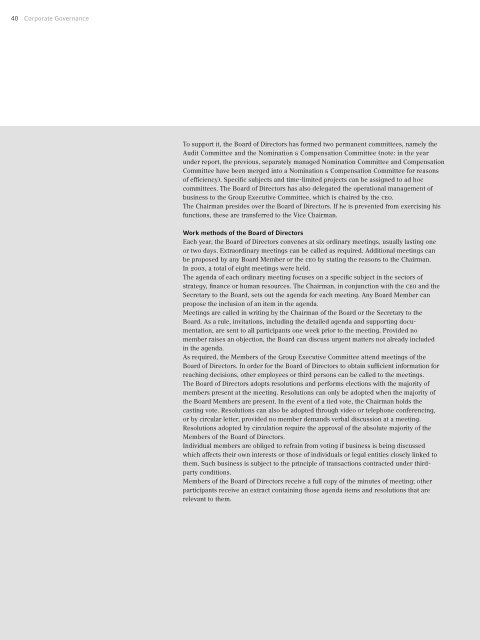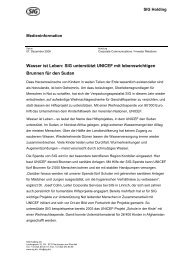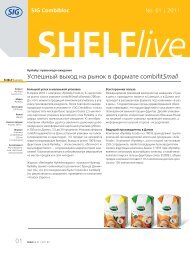Annual Report - SIG Combibloc
Annual Report - SIG Combibloc
Annual Report - SIG Combibloc
You also want an ePaper? Increase the reach of your titles
YUMPU automatically turns print PDFs into web optimized ePapers that Google loves.
40 Corporate Governance<br />
To support it, the Board of Directors has formed two permanent committees, namely the<br />
Audit Committee and the Nomination & Compensation Committee (note: in the year<br />
under report, the previous, separately managed Nomination Committee and Compensation<br />
Committee have been merged into a Nomination & Compensation Committee for reasons<br />
of efficiency). Specific subjects and time-limited projects can be assigned to ad hoc<br />
committees. The Board of Directors has also delegated the operational management of<br />
business to the Group Executive Committee, which is chaired by the ceo.<br />
The Chairman presides over the Board of Directors. If he is prevented from exercising his<br />
functions, these are transferred to the Vice Chairman.<br />
Work methods of the Board of Directors<br />
Each year, the Board of Directors convenes at six ordinary meetings, usually lasting one<br />
or two days. Extraordinary meetings can be called as required. Additional meetings can<br />
be proposed by any Board Member or the ceo by stating the reasons to the Chairman.<br />
In 2003, a total of eight meetings were held.<br />
The agenda of each ordinary meeting focuses on a specific subject in the sectors of<br />
strategy, finance or human resources. The Chairman, in conjunction with the ceo and the<br />
Secretary to the Board, sets out the agenda for each meeting. Any Board Member can<br />
propose the inclusion of an item in the agenda.<br />
Meetings are called in writing by the Chairman of the Board or the Secretary to the<br />
Board. As a rule, invitations, including the detailed agenda and supporting documentation,<br />
are sent to all participants one week prior to the meeting. Provided no<br />
member raises an objection, the Board can discuss urgent matters not already included<br />
in the agenda.<br />
As required, the Members of the Group Executive Committee attend meetings of the<br />
Board of Directors. In order for the Board of Directors to obtain sufficient information for<br />
reaching decisions, other employees or third persons can be called to the meetings.<br />
The Board of Directors adopts resolutions and performs elections with the majority of<br />
members present at the meeting. Resolutions can only be adopted when the majority of<br />
the Board Members are present. In the event of a tied vote, the Chairman holds the<br />
casting vote. Resolutions can also be adopted through video or telephone conferencing,<br />
or by circular letter, provided no member demands verbal discussion at a meeting.<br />
Resolutions adopted by circulation require the approval of the absolute majority of the<br />
Members of the Board of Directors.<br />
Individual members are obliged to refrain from voting if business is being discussed<br />
which affects their own interests or those of individuals or legal entities closely linked to<br />
them. Such business is subject to the principle of transactions contracted under thirdparty<br />
conditions.<br />
Members of the Board of Directors receive a full copy of the minutes of meeting; other<br />
participants receive an extract containing those agenda items and resolutions that are<br />
relevant to them.

















